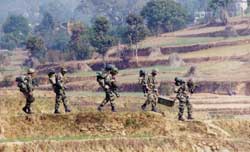 Even at noon, Besisahar, Lamjung's dusty district headquarters, wears a deserted look. By evening, there are a few people hurrying home before the seven o'clock curfew.
Even at noon, Besisahar, Lamjung's dusty district headquarters, wears a deserted look. By evening, there are a few people hurrying home before the seven o'clock curfew. After the Maoists booby-trapped an army convoy two months ago, all vehicles are stopped at the district border after 5.30 PM. There is an undercurrent of fear bordering on panic here. The locals hesitate to talk to strangers, and if they do, there are no smiles, no welcomes. Besisahar's traditional hospitality and friendliness is gone. There is fear here of the Maoists and the security forces. Too many have had friends and relatives taken in by both sides.
Not surprisingly, business is badly hurt. As the gateway to Manang, the town used to get 100 trekkers a day moving up the Marsyangdi valley. These days there are barely ten. The town's only colour lab used to process 30 rolls of films every day, these days it gets a third of that. Bal Prasad Parajuli lost his business because his lodge is situated at the northern end of Besisahar, away from the protective range of the barracks. Saraswoti Khaniya's clients don't come anymore for just the opposite reason-her tea stall is too close to the army post.
Lekhnath Adhikari, president of the Besisahar Town Development Committee, says the present calm is deceptive. "Unless an environment is created for people's representatives to return to the district, the people's desire for development will not be restored, and there will be no peace," he told us. So far, the Maoists have not attacked hotels, but lodge owners are victims of Maoist extortion. "You can call it protection money," said a hotelier who did not want to be named. "If the situation does not improve this season I'll just pack up my bags and leave." A lot of Lamjungis are doing just that. A villager from Nalma told us there is hardly anyone left in his village except children and women.
This isn't new for Lamjung, people from here have traditionally migrated to serve in the Indian or British armies or to work in India. But this exodus is on a much bigger scale. Lamjung's young left in the thousands when the Maoists started forced recruitment after the declaration of the jilla jana sarkar ("district people's government") last August. Many of those who stayed joined the militia during the three-month ceasefire. Those who resisted, or quit the insurgency disillusioned, are vulnerable to the Maoists and the security forces. Security sources in Lamjung told us that most of the Maoists put in the district jail are teenagers, or in their early 20s. Lamjung Chief District Oficer Shiva Prasad Nepal admits the youth feel trapped. "Maoist dissidents are secretly migrating to Kathmandu and other towns. They are afraid of being taken in by both sides," Nepal told us.
The local people are of little help-they're so afraid of Maoist retribution, they do not disclose the identity or whereabouts of Maoists who have extorted money from them. "Even the elected representatives are reluctant to inform the police about the whereabouts and identities of the Maoists," said Pitamber Adhikari, who heads the Lamjung District Police Office.
The main casualty of this atmosphere of fear and panic is development. Lamjung's development budget was Rs 5 million. This was slashed by ten percent after the government diverted money for security. The Middle Marsyangdi hydropower project will bring a Rs 20 million bonanza, but not for another five years.
Development work in this district has come to a halt," says Jamindra Man Ghale, DDC chairman. Nearly three-quarters of Lamjung's population is literate, much better than the national average. But education has been badly affected by the Maoist threats against schools. Some 10,000 students in 30 private schools, including the Himalchuli Boarding School, which has a record for best SLC results, have nowhere to go. Work on the German-funded 39 km Karaputar-Samle Bhanjyang-Singdi road is suspended.
Security sources say about 100 suspected Maoists have been interrogated, and both the army and the local administration claim the Maoists are on the run. But even DSP Adhikari admits the peace can't last unless there is rehabilitation and development. He says: "We have to step in and fill the vacuum after the Maoists are chased away."


